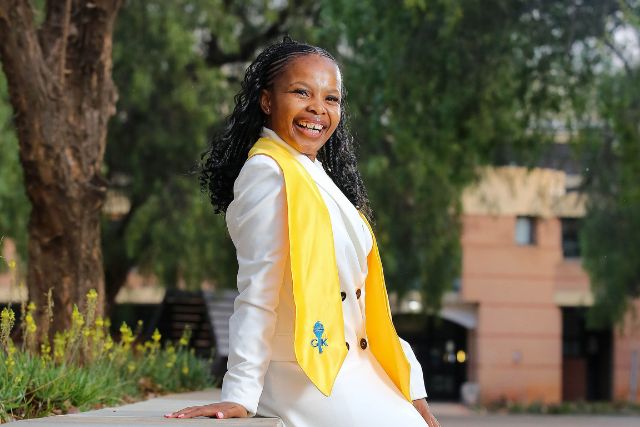From a young boy in Kanana captivated by the sparkle of fireworks to a PhD candidate breaking new ground in nanotechnology and electrochemistry, Mokole Seleke John embodies the spirit of curiosity and perseverance. His journey at the North-West University (NWU) is one of passion, purpose, and progress, fueled by a fascination with chemistry and a drive to make a meaningful impact in the real world. Recently awarded third place in NWU’s Research Week PhD category, Mokole is developing innovative ways to detect harmful pollutants in water, protecting people and the planet.
Through his work, he hopes to inspire others to dream boldly, work hard, and believe that greatness is possible, no matter where you start. We sat down with Mokole to learn more about his journey, his research, and the spark that continues to drive his passion for science.
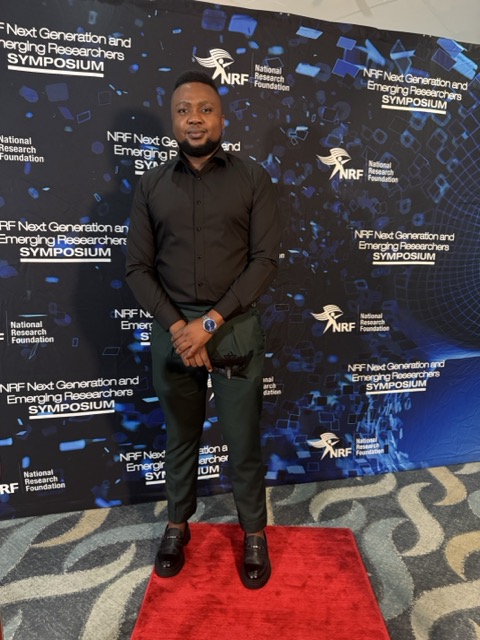
Can you tell us a bit about yourself, where you’re from, what inspired your interest in Chemistry, and what you’re currently studying at NWU?
My name is Mokole Seleke John, and I'm from Kanana, a town in Orkney, North-West Province. Growing up, I was fascinated by explosives and the chemistry behind them. Watching firecrackers light up the sky was like magic to me. I was also drawn to TV shows featuring scientists in lab coats, experimenting and discovering new things. My high school teacher, Mrs Qaba, further nurtured this interest, making chemistry feel accessible and fun. We also had some amazing visitors, including Makamohelo Phantsi, who now holds a master’s degree in Space Physics, and Sinethemba Manquthu, who has a master’s degree in chemistry. Hearing about their journeys and achievements really motivated me. I'm currently pursuing my PhD in Chemistry at North-West University (NWU), where I'm exploring nanotechnology and electrochemistry. To me, being an instrument of hope is about inspiring others to dream big and believe in their potential. I want to show people that no matter where you come from or what challenges you face, you can achieve greatness with hard work and determination. I'm passionate about motivating others to chase their dreams, just as I've been fortunate enough to chase mine.
How did your journey with the NWU begin? What made you choose NWU for your studies, and what has your experience been like so far?
My journey with NWU began uniquely. During my matric year at Tshebedisano Secondary School, I had the opportunity to attend the April graduations (the top 10 were invited to attend). Witnessing PhD graduates receive their degrees and seeing the prestige surrounding their achievement left a lasting impression on me. I was captivated by the honour and respect accorded to them, and it sparked a desire within me to be part of this institution. Another experience that solidified my decision to choose NWU was attending the matric June camp on campus in 2015. This was my first time experiencing university life, and it was incredibly motivating. It showed me that, despite my background, I had the potential to thrive in this environment. These experiences collectively drew me to NWU. As for my experience so far, I would say it's been a mix of challenges and growth. Since starting at NWU, I've had opportunities to be a laboratory assistant and a tutor in the Chemistry department, and currently, a research assistant in the Health Science department. Each role has presented its own set of challenges, but they've all forced me to grow. I've developed valuable skills such as time management, leadership, teamwork, and resilience. Being a laboratory assistant taught me attention to detail, while tutoring honed my communication skills and patience. My current role as a research assistant has broadened my understanding of interdisciplinary research and collaboration. I've also had the opportunity to make friends, meet new people in the academic space, and learn from them.
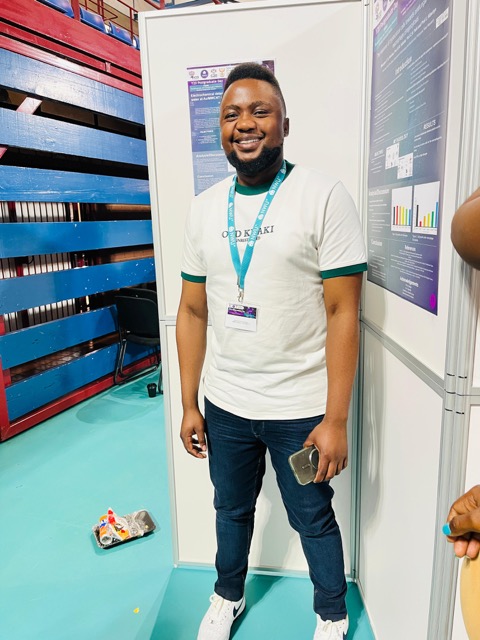
Congratulations on your win during Research Week! Can you tell us about the competition, which category you participated in, and what position you achieved?
I'm thrilled to share that I participated in the Research Week competition at NWU, specifically in the PhD category. After a tough competition, I was awarded 3rd position, which is an incredible honour. It was a great experience showcasing my research. The exposure and recognition will definitely motivate me to keep pushing the boundaries in my field.
Your study has quite an impressive title! Could you explain your research, “Electrochemical detection of methylene blue dye in river water at Au/MWCNT modified electrode”, in simpler terms for readers who might not have a Chemistry background?
My research focuses on developing a highly sensitive electrochemical sensor to detect methylene blue, a toxic dye commonly used in the textile industry. If not properly treated before disposal, methylene blue poses significant environmental and health risks, including cancer, infertility, respiratory issues, cardiovascular problems, and harm to aquatic life due to reduced oxygen levels and sunlight blockage. To address this issue, I've utilised nanotechnology to synthesise and combine gold nanoparticles with multi-walled carbon nanotubes, exploring both green synthesis and chemical synthesis methods to compare their properties and effectiveness. By harnessing the synergistic properties of these materials, the resulting nanomaterials enhance electrochemical detection techniques, such as cyclic voltammetry, square-wave voltammetry, and electrochemical impedance spectroscopy, enabling accurate measurement of low methylene blue concentrations in water. The ultimate goal is to ensure water safety for both human consumption and aquatic ecosystems by detecting the dye and ensuring it is at non-threatening levels.
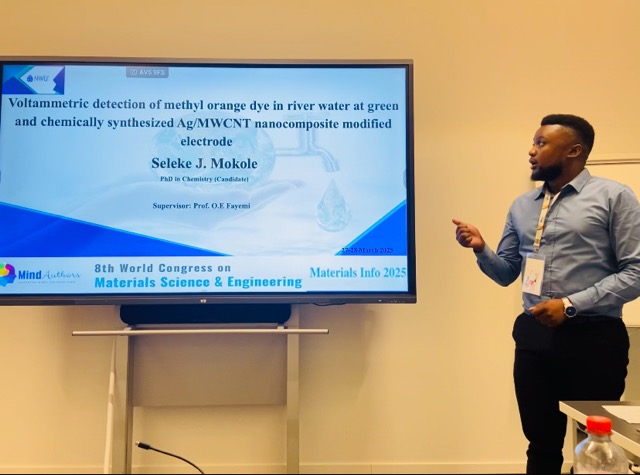
What inspired you to focus on detecting methylene blue dye in river water? Was there a personal or environmental motivation behind this research?
Growing up in Kanana (Orkney), where the Vaal River flows, I witnessed firsthand the importance of water quality and the concerns surrounding it. This sparked my interest in researching water pollutants. When exploring potential areas of focus, I deliberately steered away from heavy metals, given the abundance of research in that area. Instead, I turned my attention to the textile industry, which is the second-largest polluter of water globally, contributing around 17-20% to water pollution. The impact of this industry on our water resources is substantial, and I wanted to contribute to addressing this issue. I became fascinated with the potential of metal nanomaterials in sensor applications, leveraging their properties to enhance detection capabilities for various pollutants. My research specifically focuses on detecting and comparing cationic dyes, such as methylene blue, and anionic dyes, like methyl orange, as well as evaluating the sensor's selectivity using sunset yellow as an interfering compound. This comprehensive approach allows me to assess the versatility and effectiveness of my sensors in detecting a range of water pollutants.
The science behind your study sounds fascinating. What was the most exciting or challenging part of working with nanomaterials like gold nanoparticles and carbon nanotubes?
One of the most challenging aspects has been ensuring the reproducibility and stability of nanomaterial-modified electrodes. This has involved a lot of trial and error, as well as a deep dive into the literature to understand the underlying mechanisms and to identify strategies that could improve the performance of my sensors. What's fascinating, though, is that every challenge leads to a new discovery, which in turn sparks more curiosity. Every time I encounter an unexpected result or a new phenomenon, I find myself reading more about it in literature, and that process has been incredibly rewarding. It's a continuous cycle of learning and exploration, and I find it truly captivating.
Research takes time, patience, and passion. Who or what kept you motivated throughout your project?
Research can be an emotional rollercoaster, especially during the experimental phase. There are times when things don't go as planned, and frustration can be overwhelming. What kept me motivated throughout this journey was the unwavering support from my family and friends. Knowing that my supervisor was always available for discussions and offered valuable guidance on alternative approaches was a huge source of comfort. Her support and encouragement helped me navigate the tough times. Additionally, being a role model to my young nephew, Atlehang Nkunyane, has been a significant motivator. I want to show him that perseverance, hard work, and determination can lead to achieving one's goals. But more than that, I want to teach him that his environment and circumstances can never define his capabilities and destiny. I hope to inspire him to believe in himself, to dream big, and to know that with dedication and resilience, he can overcome any obstacle.
How did it feel when your name was announced as one of the winners during Research Week? Can you describe that moment?
When my name was announced as one of the winners during Research Week, I felt an overwhelming sense of excitement and validation. For me, the biggest challenge has always been distilling my complex research into relatable, accessible language, while also making it engaging and entertaining for my audience. To achieve this, I work on incorporating storytelling techniques and humour into my presentations. Hearing my name called was a thrilling confirmation that I'd finally cracked the code and effectively communicated my research in a way that resonated with others. In that moment, I thought to myself, "Yes, I've got this!" It was a proud moment that reinforced the hard work I'd put into refining my presentation skills.
How do you see your research making an impact, either in the community, in industry, or in the field of Chemistry as a whole?
I see my research having a real impact in several areas. By developing a sensor that can detect pollutants like methylene blue in water, I'm hoping to make a difference in communities where clean water is a concern. This technology could be a game-changer for industries like textiles, where wastewater treatment is a big deal. If my sensor can help them monitor and manage their water quality more effectively, that would be amazing. In the broader field of Chemistry, I'm excited to see where this research takes us. Nanotechnology has so much potential for creating innovative solutions, and I hope my work contributes to that. Ultimately, I just want to make a positive difference and inspire others to do the same, whether that's through cleaner water, a healthier environment, or pushing the boundaries of what's possible in science.
What’s next for you after this achievement? Are there any plans to expand your research, publish your findings, or pursue further studies?
Since the beginning of my PhD, I've already published three papers, and my fourth one has just been accepted for publication in Environmental Sciences Europe, which is a great milestone. Currently, I'm exploring the potential of these nanomaterials in detecting other analytes, with plans to publish those findings soon. I've also been fortunate to have had several opportunities to share my research, including presenting in Berlin, Germany this year and winning the Best Presentation Award at the NWU Climate and Water Symposium last year. These experiences have not only broadened my perspective but also reinforced my commitment to translating research into practical solutions. However, my goal is to take this research from the lab to real-world applications. I aim to develop a functional sensor that can be commercialised and have a tangible impact on my community and country. Given the significant investment my country has made in funding this research, I believe it's essential to translate these findings into practical solutions that benefit society. I'm committed to seeing this project through to its full potential and making a meaningful difference.
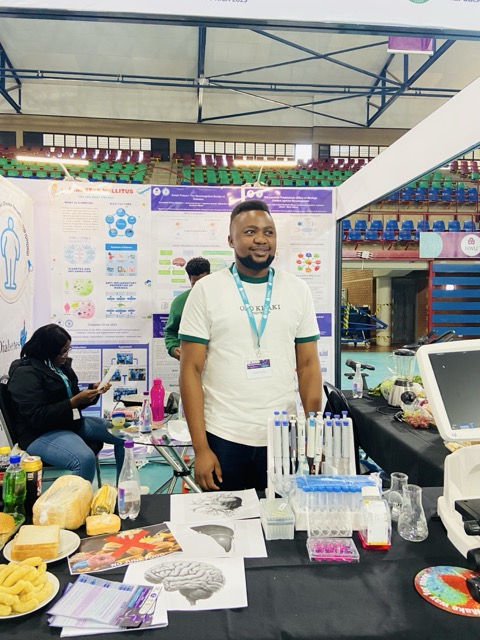
Let’s shift gears a little. When you’re not in the lab, what do you enjoy doing to relax or recharge?
Honestly, I'm a bit of a homebody, so I love spending time with my loved ones, watching movies or TV shows, and forgetting about research for a bit. Visiting home to spend time with my little nephew is always a highlight; he's a bundle of energy and always knows how to make me laugh. It's the simple things that help me recharge and keep going.
Lastly, what advice would you give to fellow NWU students or young researchers who want to make their mark in science?
My advice would be to stay curious and be persistent. Science can be challenging, and setbacks are inevitable, but don't let that discourage you. Keep pushing the boundaries, ask questions, and seek out opportunities to learn and grow. Surround yourself with people who support and inspire you, and don't be afraid to collaborate and share your ideas. Most importantly, find a problem you're passionate about and let that drive your research. And as you pursue your goals, remember to take care of yourself and don't lose yourself in the process, your well-being is just as important as your research.


